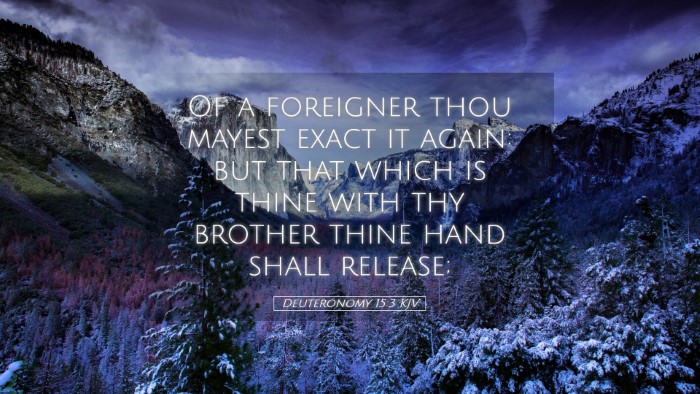Commentary on Deuteronomy 15:3
Deuteronomy 15:3 states:
"Of a foreigner you may require it; but whatever of yours is with your brother your hand shall release."
Contextual Overview
This verse is situated within the larger framework of laws pertaining to debt release and social justice among the Israelites. It follows the stipulations laid out for the sabbatical year, where debts were to be forgiven and inequality was addressed. This context is crucial as it highlights the importance of communal welfare and mercy within the covenant community.
Exegesis and Insights
-
Matthew Henry's Commentary:
Henry emphasizes the moral obligation towards fellow Israelites that God expects. The release of debts would not only reflect a spirit of generosity and forgiveness but also strengthen community bonds. There is a clear delineation between how the Israelites are to treat each other compared to how they would treat foreigners. This principle reinforces the idea that while mercy is paramount, it is particularly emphasized within the covenant community.
-
Albert Barnes' Notes:
Barnes puts forth the interpretation that this verse distinguishes between debts owed by Israelites versus those owed by foreigners. He suggests that the commands illustrate a divine order intended to promote equity within the community. Barnes also highlights the importance of understanding the social dynamics within Israel as it pertains to economic relationships, where mercy and justice are to coexist.
-
Adam Clarke's Commentary:
Clarke sheds light on the practical ramifications of this command. His analysis suggests that this principle fosters an atmosphere of trust and mutual assistance among believers. The emphasis on releasing debts reinforces the values of compassion and community responsibility, asserting that believers were not to exploit one another, but rather to support and uplift one another during times of economic hardship.
Theological Reflections
This verse underlies a foundational theological concept in biblical faith: the call to love one another as God loves His creation. By obligating the Israelites to release debts among themselves, God illustrates His character as compassionate and just. This highlights an essential requirement for any follower of God—to extend grace and mercy to one another, especially in times of need.
Key Themes
-
Community Welfare:
The directive to forgive debts among brethren showcases a commitment to community solidarity. This teaches the Church today the vital role of mutual support and care within the body of Christ.
-
Divine Justice:
God’s instructions display His concern for justice, especially among His people. The differentiation between treatment of foreigners and brothers illustrates the deep connections within a faith community.
-
Mercy and Forgiveness:
This command promotes a culture of mercy that echoes throughout scripture, culminating in the New Testament's call to forgive as we have been forgiven. It reflects the core of the Gospel message where grace prevails over debt.
Practical Applications
In contemporary settings, church leaders and congregations can draw from this passage valuable insights about handling economic relationships within the church and the broader community:
-
Cultivating Generosity:
Encourage fostering a spirit of generosity, where members of the church are willing to help one another financially, mirroring the divine mandate of forgiveness.
-
Promoting Equity:
Church leaders are called to champion social justice and advocate for practices that ensure everyone in the congregation is cared for, reflecting God's heart.
Conclusion
Deuteronomy 15:3 serves as a timeless reminder of the importance of mercy, community, and justice. Through the lenses of historical context and theological reflection, this verse challenges believers today to embody the principles of grace, forgiveness, and equity in their dealings with one another. It calls upon pastors, theologians, and laypersons alike to integrate these values into their lives, contributing to a faith community that reflects the love and justice of God.


